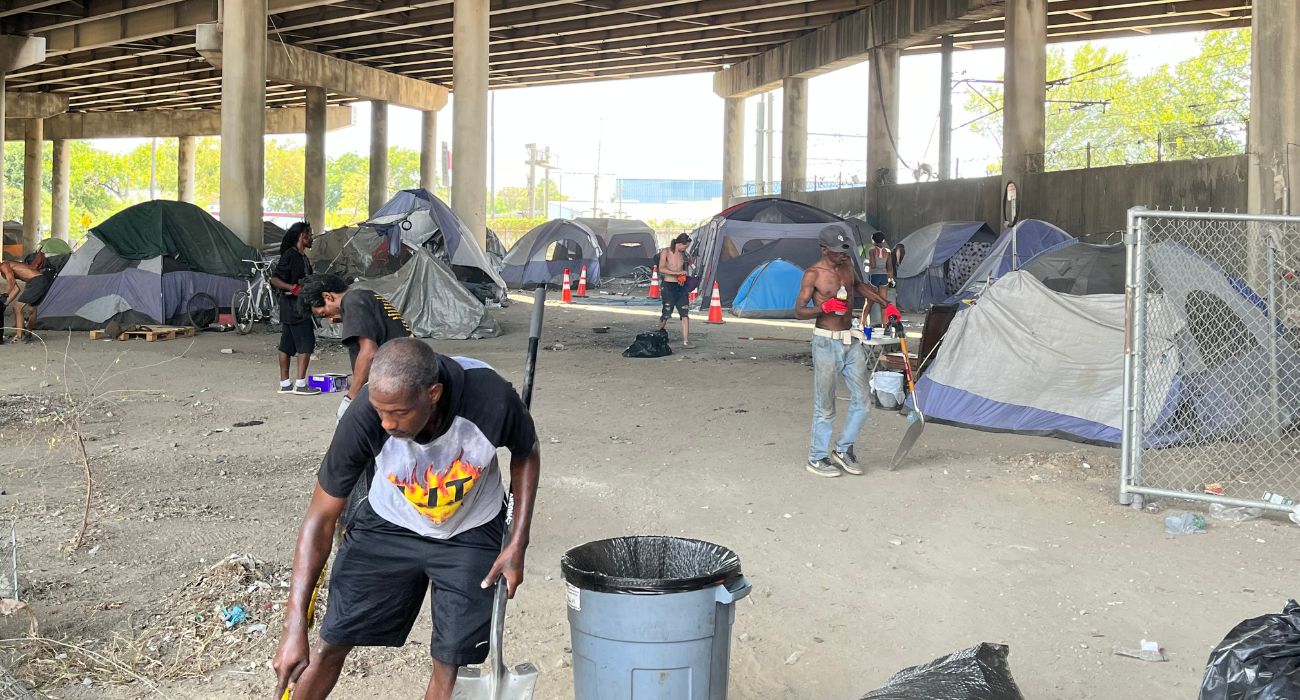A local ministry took to the streets to clean up trash at one of the largest homeless encampments in Dallas last Thursday.
More than 30 tents populate the encampment, which sits under Interstate 45 near the 2300 block of Harrison Avenue. The cleanup was hosted by Bring the Light Ministries, a nonprofit that reaches out to the homeless.
Pastor Earl Fitzsimmons, the ministry’s founder and CEO, was serving food to the encampment’s population on Tuesday when he was struck by how much trash littered the area.
“I just got fed up with all the garbage and said, ‘We’re going to clean this place up,’” he told The Dallas Express. Bring the Light provided trash bags, shovels, rakes, and other supplies needed to clean the area. Fitzsimmons, his wife, and some of the homeless people there got to work.

“The problem with tent cities is that they have no resources to keep their area clean,” Fitzsimmons said. “There are no garbage cans.”
Fitzsimmons told The Dallas Express that the City’s homelessness and vagrancy crisis has become “one of, if not the most, drastic humanitarian crisis to ever hit Dallas.”
The sentiment has been echoed by 75% of Dallas residents, who believe homelessness and vagrancy are “major” problems for the City, as previously reported by The Dallas Express.
Fitzsimmons said Bring the Light is “hoping to create a pattern where we’re not depending upon the City to help maintain this crisis.”
The organization frequently hosts food banks and serves food directly to the homeless.
As previously reported by The Dallas Express, City officials have argued that a significant factor enabling and even incentivizing public vagrancy is well-meaning citizens giving food and money to the homeless.
An encampment occupant who only identified himself as Dave said everyone in the encampment does what they can to show appreciation for Bring the Light.
“They don’t have to come down here to help us clean up where we stay at,” he told The Dallas Express. “But they did, so we all pitch in and come together as a family. We do what we have to do to show the ministry that we appreciate it.”
Fitzsimmons added that the homelessness and vagrancy problem is not only getting worse in Dallas but also in the surrounding metroplex.
“We’re seeing more homeless in Plano and Tarrant County,” he said. “Rises in homelessness all around us, and unfortunately there is a small sect of the homeless population that will contribute to a rise in crime.”
Crime rates in Downtown Dallas are notably higher than in nearby Fort Worth’s downtown area, which is patrolled by a dedicated police unit and private security guards.
Furthermore, the Dallas Police Department is facing a staffing shortage, according to a City analysis that recommends about three officers for every 1,000 residents. This puts an ideal staffing level for Dallas at approximately 4,000 officers. DPD currently has 3,100 sworn officers on staff.
While homelessness and vagrancy are at critical levels in Dallas, Fitzsimmons said he hopes other organizations will step in to provide much-needed services.
“I know that partnership organizations have been calling me saying that they’re going to try and figure out how they can give us some support for our next event,” he said.
As previously reported by The Dallas Express, Fitzsimmons is developing a non-profit operation in East Dallas called The Joshua Center. He said it will be a single campus providing housing and supportive services such as counseling, medical care, and job training.
“Our goal is to sustain them in a way that they will be equipped to come off of the streets and rehabilitate themselves with our help,” Fitzsimmons explained.
A similar approach has been utilized by the nonprofit Haven for Hope in San Antonio, which has been credited with a 77% reduction in homelessness.
This has been achieved through a partnership with the City of San Antonio. However, despite favorable polling among Dallas voters, the City of Dallas has yet to pursue such a model.


